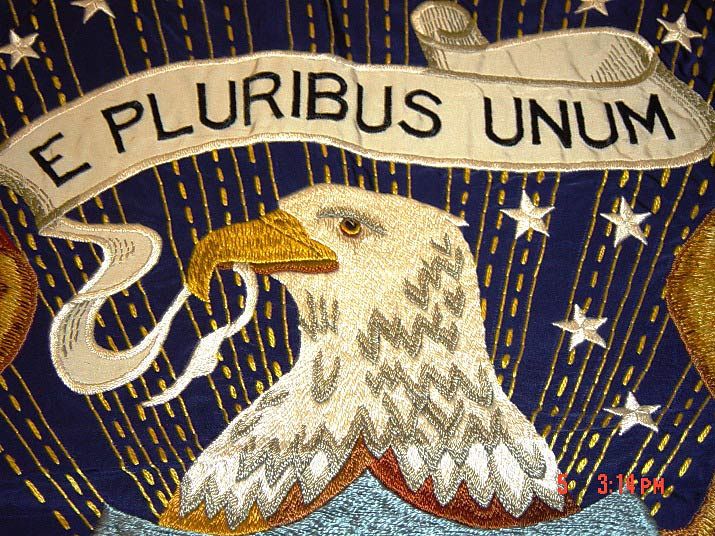God has an eternal goal of people from all nations of the world living in unity and harmony bonded together by His divine love. This is His ultimate master plan for all of mankind. His eternal kingdom will be composed of people from “every nation, tribe, people and language” (Revelation 7:9 NIV).
The similar Biblical concept that all men were created “in the image of God” (Genesis 1:27) influenced many of America’s founders and our founding documents. Though we have failed horribly at times to see every human being as a creation of God, this idea has stood before us throughout our history. It has challenged us to apply this principle in how we govern ourselves and treat one another in everyday life.
The inhumanity of man to man has been a never-ending feature of human history since Cain slew his brother Abel (Genesis 4:8). Even in our present (supposedly advanced) civilization, it has not come close to stopping. What progress there has been in eliminating atrocities such as war, genocide and slavery has been painfully slow, and has come at great cost.
There is always hope, however. In the midst of his arduous fight against slavery, Frederick Douglass once remarked: “Notwithstanding the dark picture I have this day presented of the state of the nation, I do not despair of this country. There are forces in operation which must inevitably work the downfall of slavery.”
During the most trying days of the civil rights movement, Rev. Dr. Martin Luther King Jr. made this optimistic observation: “Somehow the arc of the moral universe is long, but it bends toward justice.” He also confessed: “Yes sometimes I feel discouraged and feel my work’s in vain. But then the Holy Spirit revives my soul again.”
We all have a job to do. Whatever the condition of our nation may be at this moment in history, God has chosen us to serve Him at this present time. Christians should take this calling seriously.
When Esther was living in Persia (present-day Iran), the King of Persia passed a law ordering all of the Jewish people in his country to be killed. Esther’s uncle Mordecai told her to plead with the king on behalf of her people and challenged her with these words: “If you remain silent at this time, relief and deliverance for the Jews will arise from another place, but you and your father’s house will perish. And who knows but that you have come to the kingdom for such a time as this” (Esther 4:14 BSB). Esther took Mordecai’s words to heart, declaring, “If I perish, I perish” (Esther 4:16 KJV). Risking her life, Esther spoke out, and her people were saved from destruction.
As Esther did in her era, Frederick Douglas did in his and Martin Luther King did in his, we are all called to do what we can to make the world (in our case, America and New York) a better place in “such a time as this.”
As we consider what our specific callings might be, let’s examine the time period and the nation we have been born into. As Paul did when he met Jesus on the road to Damascus in Acts 9:6 (KJV), let’s ask: “Lord, what wilt thou have me to do?”
(I) WHAT KIND OF COUNTRY ARE WE SUPPOSED TO BE?
(A) To begin with, America is an idea. Many people have asserted that America is as much an idea as it is a nation. Here are a few examples:
(1) Paul Ryan, former Speaker of the U.S. House of Representatives: “America is the only nation founded on an idea, not an identity. That idea is the notion that the condition of your birth does not determine the outcome of your life.”
(2) Anna Quindlen, author and opinion columnist: “America is an improbable idea, a nation built of ever-changing disparate parts, it is held together by a notion, the notion that all men are created equal.”
(3) Bono, lead singer of Irish rock band U2: “Ireland is a great country, but it’s not an idea. Great Britain is a great country, but it’s not an idea. America is an idea. That’s how we see you around the world, as one of the greatest ideas in human history.”
(II) WHAT KIND OF COUNTRY HAVE WE BEEN? WHAT KIND OF COUNTRY ARE WE TODAY?
If you ask the question “Is America a great nation?” in our current political climate, you will likely hear one of two very common answers. The first common answer is: “America has always been a great country!” The second common answer is: “America was never a great country.” There are kernels of truth in each view. Consider the following propositions: (1) America has always been a great idea; (2) many times, America has miserably failed to live up to the principles upon which she was founded; and (3) to the extent that America is learning to apply its founding principles, she exhibits a kind of greatness.
America was founded upon a number of noble ideas and principles that have rarely been found in any other nation. Some of these great ideas have allowed us to become the richest and most powerful nation on earth. However, by failing to apply these principles equally, we have allowed some terrible things to happen.
(III) WHAT ARE THE IDEALS WHICH, WHEN PRACTICED, MAKE AMERICA GREAT?
Two of America’s most noble ideals are freedom and equality. Let’s look at these concepts and evaluate their importance.
(A) FREEDOM: We are a country that believes in self-government, individual freedom and inalienable rights. Some of our freedoms include:
(1) Free elections – the right to choose our leaders;
(2) Self-government – a government of the people, by the people and for the people;
(3) Constitutional checks and balances on different branches of government;
(4) The right to life, liberty and the pursuit of happiness;
(5) God-given personal freedoms and rights such as:
(a) Freedom of religion;
(b) Freedom of speech;
(c) Freedom of the press;
(d) The right to a speedy and fair trial;
(6) Equality under the law;
(7) Economic freedom – the freedom to choose one’s line of work or start a business.
These are rare and precious freedoms which Americans should treasure and protect. They are freedoms which are the longings of almost all people. Thomas Paine once said: “The cause of America is in a great measure the cause of all mankind.”
(B) EQUALITY: We are a country that states that all men are created equal and have inalienable God-given rights. This wonderful idea—though unequally applied even at the time of our founding—has operated within our national psyche by calling us to consider how we might best live it out in our laws and our actions as a nation. The Pledge of Allegiance sets forth a similar high and noble calling: To be “one Nation under God, indivisible, with liberty and justice for all.”
(1) The national motto “e pluribus unum”–which means “out of many, one”–was chosen in 1776 to be on the Great Seal of the United States. It is still featured on most of our money. The motto was meant to convey the idea that the original 13 colonies had united to become one nation. It is still fitting today to assert that America is a “melting pot” of people from all over the world who, together, form one nation. This is certainly a great ideal to work toward, and it includes the need to eliminate racism and prejudice wherever it can be found.
(2) The American dream is a dream of unity in the midst of diversity. As Rev. Dr. Martin Luther King Jr. said in his great speech: “Even though we face the difficulties of today and tomorrow, I still have a dream. It is a dream deeply rooted in the American dream. I have a dream that one day this nation will rise and live out the true meaning of its creed: ‘We hold these truths to be self-evident: that all men are created equal.’ I have a dream that one day on the red hills of Georgia the sons of former slaves and the sons of former slave owners will be able to sit down together at the table of brotherhood.”
(IV) HOW WELL HAVE WE DONE IN LIVING UP TO OUR IDEALS AS A NATION?
(A) Here, we will find that our report card includes some very low grades. The journey toward realizing our stated ideals has included some terrible failures. Among these failures are:
(1) Our often-inhumane treatment of Native Americans;
(2) The cruel and despicable institution of slavery;
(3) Over 100 years of segregation and racial discrimination after slavery was ended; and
(4) Our treatment of minority groups.
(B) Even in the midst of these failures, God raised up godly leaders to hold us accountable to our stated principles. In some areas, great progress has been made.
(1) Throughout the Bible, when people pray about injustice, God–because He is “a God of justice” (Isaiah 30:18 ESV)–raises up godly leaders to rescue those who are being oppressed. Psalm 140:12 (ESV) says: “I know that the Lord will maintain the cause of the afflicted, and will execute justice for the needy.” Psalm 37:28 (ESV) adds: “For the Lord loves justice; he will not forsake his saints.” Isaiah 38:18b (ESV) declares: “For the Lord is a God of justice; blessed are all those who wait for him.” Psalm 12:5 (NLP) says: “The LORD replies, ‘I have seen violence done to the helpless, and I have heard the groans of the poor. Now I will rise up to rescue them, as they have longed for me to do.’”
(2) We see this principle at work in the case of Moses. God raised up Moses supernaturally and used him to rescue the Hebrews from many years of slavery and “hard bondage” (Exodus 1:14 KJV). In calling Moses, “The LORD said, ’I have indeed seen the misery of My people in Egypt. I have heard them crying out because of their oppressors, and I am aware of their sufferings’” (Exodus 3:7 BSB). The NLT says, “I have heard their cries of distress.”
(3) When God responds to suffering by raising up leaders, he always calls, trains, gifts, supplies and backs up those servants supernaturally to bring them success in their efforts. The battles won by God’s people throughout the Bible were not won by human strength and ingenuity, but because God was with them and fought for them.
(4) Progress in fighting for justice against entrenched cultural power structures is often painstakingly slow, but with perseverance and divine assistance, these battles can eventually be won. When William Wilberforce conducted his long campaign against the British slave trade, his antislavery bills were voted down eleven times over a period of 47 years. They passed on the twelfth attempt.
(V) WHAT CAN AMERICAN CHRISTIANS DO TO HELP OUR COUNTRY LIVE UP TO HER POTENTIAL?
(A) We need to learn from the mistakes of history and challenge ourselves to be God’s agents for change in the present time.
(1) To encourage us in this purpose, our coming Bible studies will examine all four of the previously-listed case histories individually.
(2) We will find that, even in the darkest hours of our history, there were Christians who confronted evil, possessed Jesus Christ’s heart of compassion, and—at real risk to their lives— confronted evil and stood for freedom, justice and equal treatment of all people.
(3) It is helpful to be inspired by the lives of those who have gone before us so that we can follow their examples in the callings which God has given to us.
(B) We need to realize that there has always been evil in the world, and that there will be evil in the world until Jesus returns. We should not be surprised or disheartened by this, because Bible prophesies that evil will increase during the last years of human history. II Timothy 3:13 (NIV) says that “evildoers and imposters go from bad to worse, deceiving and being deceived.” And Jesus warns in Matthew 24:11-12 (Holman) that “false prophets will rise up and deceive many. Because lawlessness will multiply, the love of many will grow cold.”
(C) Regardless of the particular evils of our age, our calling as Christians is unchanged. That calling is:
(1) To bring the light, life and love of Christ to those who are in darkness.
(2) To fight against injustice and oppression of all kinds. Great 19th Century Christian reformer Anthony Ashley Cooper once said: “I will continue to labour so long as there is a soul to be saved, misery to be relieved, and ignorance to be enlightened.”
(D) When we encounter evil, we must be conscious that we have a unique calling to use Christian methods to bring about change.
(1) We must be careful not to let the political atmosphere of our age remove us from our mission as Christians.
(2) We may be soldiers in a war, but we are not worldly soldiers. We are Christian soldiers. While others may descend into anger, hatred and violence, the Bible gives us a different set of instructions. Romans 12:21 (ESV) tells us: “Do not be overcome by evil, but overcome evil with good.”
(E) We must realize that there will always be human needs in this world.
(1) All human beings have a need for God, for His care and protection, and for the assistance of their fellow human beings.
(2) There will always be people who need to be loved, saved, protected, and cared for. In this troubled world, God uses “first responders” to minister to the needy and suffering.
(3) James 1:27 speaks of the “pure religion” of ministering the love of Jesus Christ to orphans and widows, and Hebrews 13:2 instructs believers to show hospitality to “strangers.”
(F) God’s chief purpose is not to make America or any other country great, but rather to grow His kingdom.
(1) The founding documents of God’s kingdom are greater than those of America, for they are the 66 books of the Bible. God’s Word goes far beyond legal remedies to guarantee rights and freedoms, calling us to love our neighbors as ourselves and live by the Golden Rule.
(2) God is capable of making deeper and more transformative changes than any human government can. Though human government can be used for many good purposes, it is even more powerful to bring people into God’s “everlasting kingdom” (Daniel 7:27 KJV) and teach them to live according to His good and perfect will. Isaiah 9:6-7a (NIV) tells us: “For to us a child is born, to us a son is given, and the government will be on his shoulders. And he will be called Wonderful Counselor, Mighty God, Everlasting Father, Prince of Peace. Of the greatness of his government and peace there will be no end.”


